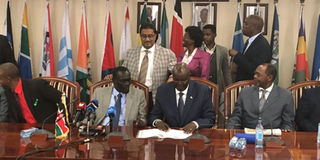Counties sign pact with clinical officers to recognise union

Council of Governors' chairman Josphat Nanok (right) and county health CECs in Nairobi on December 19, 2017 at the signing of the clinician officers' Recognition Agreement. PHOTO | ELIZABETH MERAB | NATION MEDIA GROUP
What you need to know:
- Counties have agreed to recognise the clinical officers' union.
Clinical officers have signed a recognition agreement with county governments.
By doing so, governors now recognise the clinical officers’ union as representatives of the clinicians on labour matters and can engage with the union on behalf of the clinicians.
PAY DEAL
This move will now pave way for negotiations of a collective bargaining agreement and a pay deal.
The agreement comes two months after clinicians called off their 20-day strike and signed a return-to-work formula with governors and the Health ministry in October.
The clinical officers had protested against their job evaluation and grading done by the Salaries and Remuneration Commission.
Speaking at the Council of Governors offices in Westlands, Kenya Union of Clinical Officers secretary-general George Gibore asked governors to employ more clinicians to address the shortage of workers in some counties.
HIRING
"We keep hearing of understaffing yet out of the 20,000 trained clinical officers, only 6,000 are employed. This translates to a ratio of 10 clinicians against 100,000 [patients] when the World Health Organization recommends 40 officers for the same population," said Gibore.
He urged county bosses to communicate about salary delays to workers so it is not perceived as punishment.
Responding to this, Council of Governors Chairman Josphat Nanok said pay delays do not only affect clinical officers but all county workers.
"Even governors’ salaries are affected by delays because we are paid from the same payroll," said Nanok.





